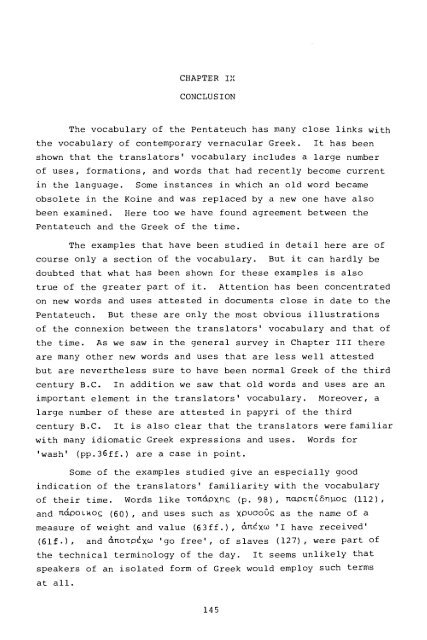A Lexical Study of the Septuagint Version of the Pentateuch
A Lexical Study of the Septuagint Version of the Pentateuch
A Lexical Study of the Septuagint Version of the Pentateuch
Create successful ePaper yourself
Turn your PDF publications into a flip-book with our unique Google optimized e-Paper software.
CHAPTER IX<br />
CONCLUSION<br />
The vocabulary <strong>of</strong> <strong>the</strong> <strong>Pentateuch</strong> has many close links with<br />
<strong>the</strong> vocabulary <strong>of</strong> contemporary vernacular Greek. It has been<br />
shown that <strong>the</strong> translators' vocabulary includes a large number<br />
<strong>of</strong> uses, formations, and words that had recently become current<br />
in <strong>the</strong> language. Some instances in which an old word became<br />
obsolete in <strong>the</strong> Koine and was replaced by a new one have also<br />
been examined. Here too we have found agreement between <strong>the</strong><br />
<strong>Pentateuch</strong> and <strong>the</strong> Greek <strong>of</strong> <strong>the</strong> time.<br />
The examples that have been studied in detail here are <strong>of</strong><br />
course only a section <strong>of</strong> <strong>the</strong> vocabulary. But it can hardly be<br />
doubted that what has been shown for <strong>the</strong>se examples is also<br />
true <strong>of</strong> <strong>the</strong> greater part <strong>of</strong> it. Attention has been concentrated<br />
on new words and uses attested in documents close in date to <strong>the</strong><br />
<strong>Pentateuch</strong>. But <strong>the</strong>se are only <strong>the</strong> most obvious illustrations<br />
<strong>of</strong> <strong>the</strong> connexion between <strong>the</strong> translators' vocabulary and that <strong>of</strong><br />
<strong>the</strong> time. As we saw in <strong>the</strong> general survey in Chapter III <strong>the</strong>re<br />
are many o<strong>the</strong>r new words and uses that are less well attested<br />
but are never<strong>the</strong>less sure to have been normal Greek <strong>of</strong> <strong>the</strong> third<br />
century B.C. In addition we saw that old words and uses are an<br />
important element in <strong>the</strong> translators' vocabulary. Moreover, a<br />
large number <strong>of</strong> <strong>the</strong>se are attested in papyri <strong>of</strong> <strong>the</strong> third<br />
century B.C. It is also clear that <strong>the</strong> translators were familiar<br />
with many idiomatic Greek expressions and uses. Words for<br />
'wash' (pp.36ff.) are a case in point.<br />
Some <strong>of</strong> <strong>the</strong> examples studied give an especially good<br />
indication <strong>of</strong> <strong>the</strong> translators' familiarity with <strong>the</strong> vocabulary<br />
<strong>of</strong> <strong>the</strong>ir time. Words like τοπάρχης (p. 98), παρεπίδημος (112),<br />
and πάροικος (60), and uses such as χρυσούς as <strong>the</strong> name <strong>of</strong> a<br />
measure <strong>of</strong> weight and value (63ff.), απέχω 'ι have received'<br />
(61f.), and άποτρέχω 'go free', <strong>of</strong> slaves (127), were part <strong>of</strong><br />
<strong>the</strong> technical terminology <strong>of</strong> <strong>the</strong> day. It seems unlikely that<br />
speakers <strong>of</strong> an isolated form <strong>of</strong> Greek would employ such terms<br />
at all.

















